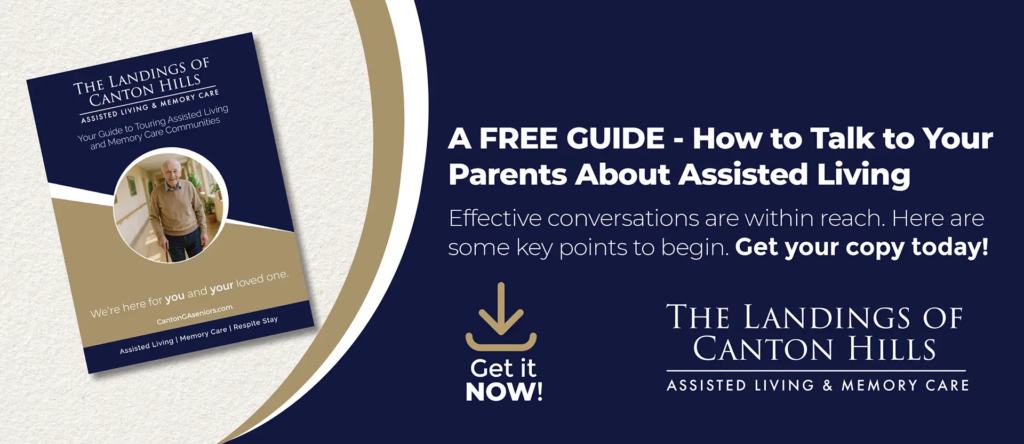The Best in Senior Care
Finding the Right Words to Talk About Assisted Living With a Loved One

If you’ve been feeling unsure about how to discuss your aging loved one’s move to assisted living, this guide can help.
Talking about assisted living with a loved one is one of the most difficult conversations anyone can have with a senior member of their family. Adult children of aging parents and grandparents are often fearful of inciting hurt feelings and creating rifts in relationships. The loved one may become defensive, insisting there is nothing wrong with them, that they are taking care of themselves “just fine.”
You may then feel guilty about suggesting the idea of assisted living. You might wonder if you are overreacting to a few incidents common to people over 65—forgetting to take medication, getting “turned around” when driving in familiar places, or neglecting personal hygiene because they don’t feel like showering or brushing their teeth. On the other hand, you might wonder if you aren’t worried enough about your loved one.
What is the best way to introduce the idea of assisted living to a loved one who is showing signs of declining independence? Continue reading for important insights about this sensitive topic to ensure everyone involved feels mutually respected, seen, and heard.
7 Tips for Opening the Dialogue About Assisted Living
1. Address Problems Before They Become Bigger Problems
Don’t postpone these talks until a crisis forces the issue. You could use everyday events, such as bringing up a local news story about a missing senior with dementia or an older neighbor’s health challenges, to create a natural way to approach the topic. When a senior’s cognitive health limits their ability to make rational decisions for themselves, you won’t be able to hold the loving, thoughtful conversation you wanted to have.
2. Ask Other Family Members to Help
Good news—you don’t have to manage the conversation alone. Before raising the topic, talk with siblings or close relatives to see if they share your perspective or if they hold different views. Understanding everyone’s concerns, not just your own, can prevent conflict later while providing a solid support system for your loved one.
3. Express Your Concerns Openly
Be upfront about why you’re bringing concerns to the table. Explain that you want your loved one to be safe and comfortable while enjoying the essential benefits of social connection and living in community with others. Inform them that you are not trying to make decisions for them and that their perspective is given top priority. This approach helps frame a complicated topic like assisted living as an act of love rather than control.
4. Respect Their Desire for Independence
Remember that your aging loved one—and everybody else, for that matter—values their independence above all. Let them continue making decisions whenever possible, but always balance their desire to remain independent with obvious safety concerns. You may feel you know what’s best, but they will probably see things differently. Unless there is an immediate danger to their well-being, listen carefully to what they have to say before presenting your side of the situation.

5. Share Useful Information
Often, older adults simply don’t know much about assisted living communities. They may think these communities are like nursing homes, where residents are confined to one room all the time. Encourage ongoing conversations about moving into assisted living by providing small amounts of information during conversations. For example, find out if your loved one may qualify for financial assistance, get the facts about what Medicaid or Medicare covers, and learn about assisted living amenities that would interest your loved one.
6. Rethink Your Approach If Necessary
If you’ve tried to hold several discussions with your loved one about assisted living but received tepid or combative responses, ask yourself the following questions:
- Are you bringing up the topic at a stressful time of day?
- Could your loved one feel rushed or pressured by the way you are approaching them?
- Are there underlying fears or experiences with senior living arrangements influencing their reaction?
- Are you using overly controlling statements that could be triggering defensiveness?
- Could assumptions about what they are trying to say be getting in the way of having productive conversations?
- Are you repeating points instead of listening to their opinions?
Inviting another family member to listen while you and your loved one discuss assisted living can provide the objective viewpoint you need to approach the subject differently.
7. Frame the Conversation Around How Much You Love, Care, and Support Them
Aging can often bring a season of loss and dwelling too much on the “good old days.” Seniors living past 65 or in their later decades will inevitably experience the loss of friends and family, become aware of a noticeable decline in their physical and mental abilities, and sometimes feel depressed as they move closer to the end of life.
Throughout your conversations about assisted living with your loved one, let them know your concern comes from love, empathy, and making their later years as safe and happy for them as possible. Pay extra attention to their worries, even when they seem repetitive or unfounded. Offer reassurance without dismissing their feelings, and give them room to make choices where possible.
Also, be aware that presenting too much information at once can overwhelm many older adults. Even if you sense they are close to accepting the idea of moving into an assisted living community, offering them multiple brochures and pages of printed information about nearby communities can be intimidating. When they do seem interested, consider taking them for a drive past a local community and saying things like, “That looks like a lovely place; everything looks new and well-maintained,” or “I’ve heard that assisted living communities offer a wealth of fun activities and weekly events, programs, and outings. Would you like to visit the community sometime, to see what it’s all about?”
Sharing neutral observations while driving past an assisted living community is a subtle form of persuasion that may encourage a senior family member to consider moving into a community, even if it’s not discussed during their conversations with you.
Addressing Your Loved One’s Common Concerns
More than likely, your senior loved one will feel anxious about moving from their familiar surroundings into a new setting. We all need time to adjust to unfamiliar surroundings, people, and routines, especially as we age. Familiarity provides a sense of comfort and stability that can be hard to give up. Additionally, aging affects memory and the ability to adapt quickly to changing conditions, making it more challenging to learn new habits and reorient oneself to different environments.
Below are a few comments your loved one may share when you first bring up the idea of considering an assisted living community:
- I’m not ready to give up my independence. Reassure your loved one that assisted living is designed to support independence, and not limit it in any way. Residents enjoy their daily routines, make their own choices about which social activities to attend, and make decisions at their own pace, all while having trained staff available if they need assistance.
- It’s too expensive and I can’t afford it. While senior living can seem like a big expense, services such as meals, utilities, housekeeping, laundry, social activities, and even transportation are often included in the monthly cost. Some communities include a base level of personalized care services as well. You and your loved one can explore financial options together, like long-term care insurance, veterans benefits, or other programs that help reduce monthly expenses.
- I’m not ready to leave home. Empathize with their fear of leaving a home they may have lived in for decades. Inform them that family members are welcome to visit at any time, and these communities can often provide complimentary Wi-Fi for video calls. The best way to ease their anxiety is to have them experience first-hand what assisted living is like by scheduling a tour with a nearby community.
Conversations about moving into assisted living with an aging loved one should evolve slowly, from mentioning the idea to addressing concerns with facts to deciding it’s time to tour a community. Touring allows everyone involved to meet the staff and residents, learn more about daily life, and explore the community inside and out. You’ll both recognize with confidence and peace of mind when it’s the right time to take the next step.

